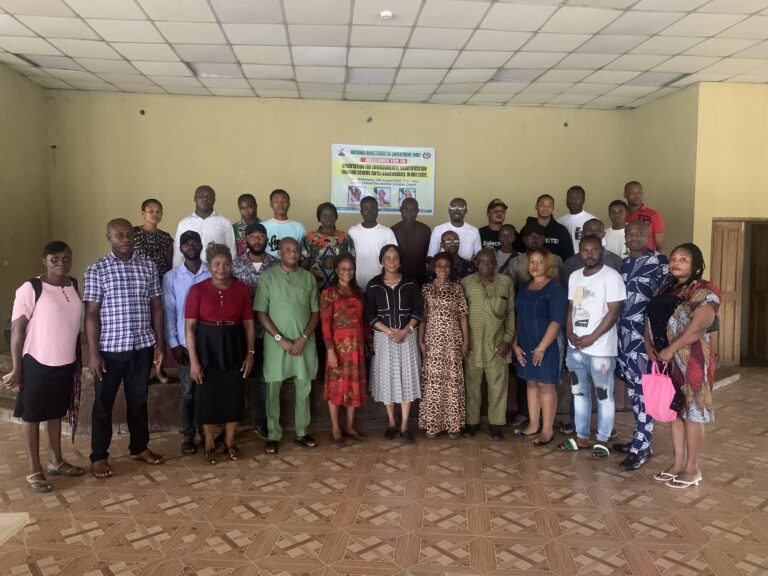News
NDE trains 30 unemployed persons on environmental beautification in Imo

(Photo: Organisers and beneficiaries of a training on environmental beautification by the National Directorate of Employment (NDE) in Owerri, on Wednesday.)
The National Directorate of Employment (NDE) says it has begun the training of 30 unemployed persons on environmental beautification skills in Imo.
The Director-General of NDE, Mallam Abubakar Nuhu-Fikpo, disclosed this at the inauguration of the exercise in Owerri, on Wednesday.
Nuhu-Fikpo, represented by the Imo Coordinator of the NDE, Mrs Chisara Egwim-Chima, said the 30 trainees drawn from all 27 council areas of Imo, would undergo training for a period of three months.
He pointed out that the training, organised by the directorate’s Department of Special Public Works (SPW), was aimed at equipping unemployed persons with viable skills to enable them earn a living without necessarily waiting for white collar jobs.
He thanked President Bola Tinubu for continuing to use the NDE in the reduction of unemployment and urged beneficiaries to make the best use of the skills to be taught.
“ You are the fortunate few selected from among a pool of applicants and I congratulate you.
“My advice is that you show commitment to the training and listen to your trainers so that in turn, you will make excellent entrepreneurs and be able to further reduce the unemployment rate in Nigeria “, he said.
Speaking, Egwim-Chima, a lawyer, who was represented by Mrs Theresa Nwachukwu, an Assistant Director with the directorate, advised the trainees “to take the training serious, as a lot of money had been expended on the exercise”.
She also thanked the director of the SPW department, Mrs Roseline Olaomi, for her tireless efforts in promoting training programmes for Nigerians through the department.
Also, the directorate’s Head of Department, SPW in Imo, Mrs Kechikarere Anochiri, mentioned the skills to be taught to include soft and hard landscaping as well as Plaster of Paris (POP).
She added that the directorate would present the trainees with start-up packages at the end of the training period.
One of the trainees for hard landscaping, Mr Ebere Osuagwu, thanked the NDE for the opportunity and promised to make the best use of the skills learned.
News
Woman killed while crossing road in Anambra

The Federal Road Safety Corps (FRSC), Anambra State Sector Command, has confirmed the death of a woman in an accident at Okpoko Market on the Asaba-Onitsha Road.
The Sector Commander, Mr Adeoye Irelewuyi, who confirmed the accident to journalists in Awka on Thursday, said that the woman was hit while she was crossing the road.
He said that the accident, which occurred on Wednesday, involved a commercial tow truck with registration number XA550BMA.
“Eyewitness report reaching us indicates that the truck was towing a vehicle in an uncontrollable speed along the axis.
“The vehicle that was being towed got detached from the tow truck.
“It hit and killed a female adult, who was said to be crossing the road, while the tow truck continued its movement.
“FRSC rescue team came to the scene and took the woman to Toronto Hospital, Onitsha, where she was confirmed dead and her body deposited at the hospital’s mortuary,” he said.
While sympathising with the family of the dead, the sector commander urged motorists, especially tow truck drivers, to exercise a high level of professionalism.
He also urged the drivers to always use standard equipment and avoid speeding.
News
LASG’s maize palliative impactful, says poultry association chair

The Chairman, Poultry Association of Nigeria (PAN), Lagos State Chapter, Mr Mojeed Iyiola, said the state government’s maize palliative to members of the association made a positive impact on the sector.
Iyiola said this in an interview with the News Agency of Nigeria (NAN) on Thursday in Lagos.
“We received about 150,000 tons of maize in February from the Lagos State government as palliative to cushion the effect of high feed prices.
“The major benefit of the palliative is that it actually cushioned the cost of production for most poultry farmers in the state.
“The palliative was beneficial as it made the cost of some poultry produce, especially eggs to drop,” Iyiola said.
He noted that prior to the palliative, a crate of egg was sold between N3,500 and N3,700 at the farm gate, but after the palliative, it now sells between N3,200 and N3,400.
According to the PAN chair, retailers and middlemen who sell from N3,800 to N4,200 do that for their personal gain.
“We have urged our members to sell their eggs at reasonable prices following the receipt of the palliative from the government.
“We appreciate the Lagos State government for the palliative but we also urge the federal government to do likewise, to further reduce the cost of production in the sector.
“This will consequently lead to drop in the prices of all poultry produce across board,” he said.
He said the palliative was shared among financial members of the association at no extra cost.
“As an association we shared the grains equally across PAN’s eight zones in the state equally. We also mandated each zone not the sell even a grain of the maize.
“We, however, considered new poultry farmers who wanted to the join the association as beneficiaries of the palliative,” said Iyiola.
He noted that through the palliative, more poultry farmers were recruited into the association.
“The maize was shared only to poultry farmers and not feed millers, it is the major component of poultry feed formulation,” he said.










